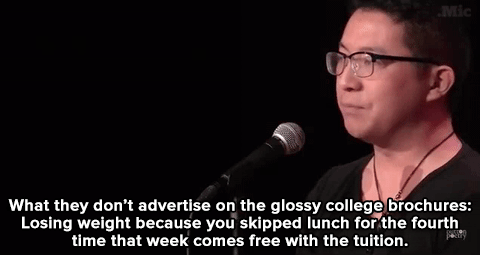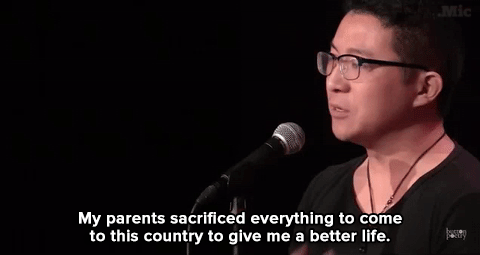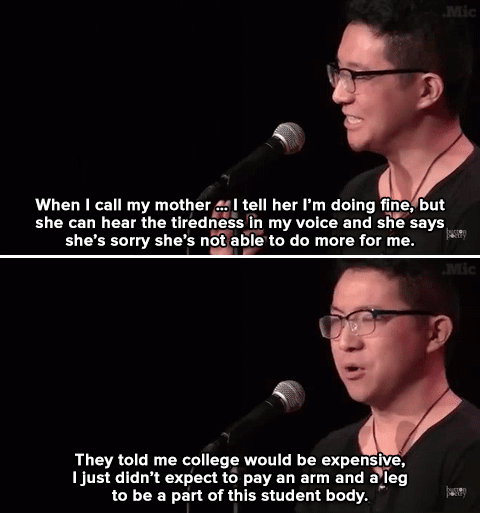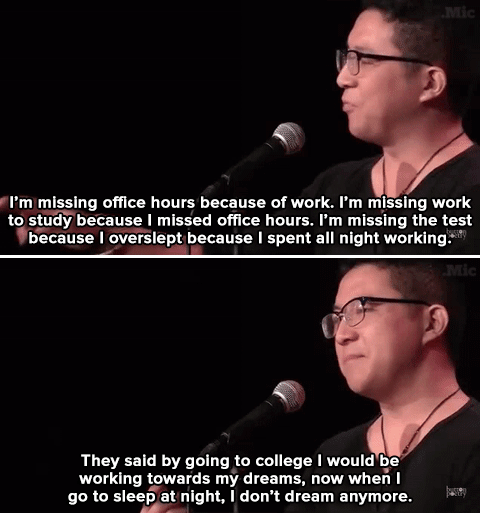Computer Science | Software Engineering | Space | Book Nerd | I have no idea what I am doing
Don't wanna be here? Send us removal request.
Photo










Watch: Brian Yu’s heartbreaking poem will strike anyone with students loans to the core.
408K notes
·
View notes
Text
Work Smarter, Not Harder: study tips psychology taught me
study in shorter intervals and take breaks (ie, 40 minutes studying and 20 minutes break)
during your break don’t watch tv or surf the internet. get outside if you can and go for a walk. or at least listen to some instrumental music and walk around your hall. or meditate or do some art. anything that doesn’t require super directed attention. this allows your attention to be replenished. it’s like a muscle and you gotta give it time to rest. tv doesn’t allow for that.
relate the information to yourself and your life. creating visual images will improve your memory.
when studying, take notes by hand and put them in your own words. generating material yourself will encode the material better in your brain, and you’ll remember it better
don’t just reread, rehearse! quiz yourself on the materials. if you use a visual image “memory palace” technique, walk yourself through it. you’re likely to remember information you’ve tested yourself on better.
organizing information into groups that make sense create more connections in your brain and allow you to remember things better. the more meaningful connections you make, the better.
make sure the last thing you do before bed is study. no phone, no netflix. your brain will process what you’ve just done while you sleep and this improve recall.
(feel free to add any!)
27K notes
·
View notes
Text
Do yourself a favor. Learn to code. Here's how.
I’ve said this to my non-techie friends countless times. It’s no secret that being able to code makes you a better job applicant, and a better entrepreneur. Hell, one techie taught a homeless man to code and now that man is making his first mobile application.
Learning to code elevates your professional life, and makes you more knowledgeable about the massive changes taking place in the technology sector that are poised to have an immense influence on human life.
(note: yes I realize that 3/5 of those links were Google projects)
But most folks are intimidated by coding. And it does seem intimidating at first. But peel away the obscurity and the difficulty, and you start to learn that coding, at least at its basic level, is a very manageable, learnable skill.
There are a lot of resources out there to teach you. I’ve found a couple to be particularly successful. Here’s my list of resources for learning to code, sorted by difficulty:
Novice
Never written a line of code before? No worries. Just visit one of these fine resources and follow their high-level tutorials. You won’t get into the nitty-gritty, but don’t worry about it for now:
Dash - by General Assembly
CodeAcademy
w3 Tutorials (start at HTML on the left sidebar and work your way down)
Intermediate
Now that you’ve gone through a handful of basic tutorials, it’s time to learn the fundamentals of actual, real-life coding problems. I’ve found these resources to be solid:
Khan Academy
CodeAcademy - Ruby, Python, PHP
Difficult
If you’re here, you’re capable of building things. You know the primitives. You know the logic control statements. You’re ready to start making real stuff take shape. Here are some different types of resources to turn you from someone who knows how to code, into a full-fledged programmer.
Programming problems
Sometimes, the challenges in programming aren’t how to make a language do a task, but just how to do the task in general. Like how to find an item in a very large, sorted list, without checking each element. Here are some resources for those types of problems
Talentbuddy
TopCoder
Web Applications
If you learned Python, Django is an amazing platform for creating quick-and-easy web applications. I’d highly suggest the tutorial - it’s one of the best I’ve ever used, and you have a web app up and running in less than an hour.
Django Tutorial
I’ve never used Rails, but it’s a very popular and powerful framework for creating web applications using Ruby. I’d suggest going through their guide to start getting down-and-dirty with Rails development.
Rails Guide
If you know PHP, there’s an ocean of good stuff out there for you to learn how to make a full-fledged web application. Frameworks do a lot of work for you, and provide quick and easy guides to get up and running. I’d suggest the following:
Cake PHP Book
Symfony 2 - Get Started
Yii PHP - The Comprehensive Guide
Conclusion
If there’s one point I wanted to get across, it’s that it is easier than ever to learn to code. There are resources on every corner of the internet for potential programmers, and the benefits of learning even just the basics are monumental.
If you know of any additional, great resources that aren’t listed here, please feel free to tweet them to me @boomeyer.
Best of luck!
435K notes
·
View notes
Note
Hi I am a 13 year old girl looking to pursue a career in computer science and I would like to start from a young age. I was wondering what programming languages you could suggest to me as a beginner (I have not learned any programming languages yet)
For a beginner language, I would suggest Python. It is easily accessible, and the development studio for it is very lightweight.
The software to create Python programs in it is called IDLE and can be found [here].
If you need a tutorial in it, there are tonnes of resources. These include:
- Learn Python - An online, semi guided, tutorial.
- Code Academy - An online, fully guided, tutorial.
And then the Python website has a huge list of all the tutorials you could possibly need [here].
If you need any advice, all I can really say is get stuck in, and don’t be afraid to fail. Writing code, of any kind, you will find you will make a TONNE of mistakes, but that is all part of the process. Every developer goes through it. And even the best developers still make a load of mistakes. Just keep battling on!
Good luck to you!
186 notes
·
View notes
Photo

The Royal Ballet’s production of Giselle ¨*•♫♪
2K notes
·
View notes
Photo

Interviews can be horribly intimidating, but if you prepare well enough, feel confident in yourself, and keep your cool, then you’ll do amazingly! Here are some tips on how to ace interviews in different situations, with some general tips thrown in for fun. Good luck, and hopefully something in here will help you out!
College Interviews
Tips
Know plenty about the college you’re applying to. Highlighting a particular attribute you love about the college as well as having a good general knowledge base shows the interviewer that you are sincerely interested and have done your homework.
Be able to describe why you are a good fit for the college. Interviewers want to ensure that you’re a good candidate both in paper and on person, so consider things you’ve done that show character.
Choose a favourite book and be able to talk about it. College interviewers love to ask, so think about the impression you want to give beforehand and consider it carefully.
Have a question about the college that the website doesn’t answer. It shows your preparedness, and gives you a way to continue the conversation and demonstrate your interest in the interviewer’s perspective!
Bring a copy of your academic resume. Interviewers will see you as more prepared, have a concrete reference for their write-up, and have talking points during the interview for anything interesting that’s on there.
Resources
Collegeboard Big Future
Princeton Review Tips
CBS 13 College Interview Questions
Emma Willard Advice & Sample Questions
13 Tips for Skype Interviews
College Interviews: The Basics
Scholarship Interviews
Tips
Be able to tell the interviewer why you deserve the scholarship. Don’t simply rattle off your achievements, but rather present yourself as the student most aligned with the scholarship’s mission and the most ready to succeed.
Make sure to link your accomplishments to the scholarship’s mission statement. Scholarship providers often have pillars (like philanthropy, promoting the community, etc.) which you should uphold.
Don’t be afraid to take a moment to think about oddball questions. It’s better to give a well-developed and thought out response to which vegetable you’d be than bumble through it simply because it was unexpected!
Know your application essays well. I’ve been asked to elaborate on my community service plans and why I chose to do band because of my essays, so knowing the topics well will undoubtedly help you out and show passion.
Resources
BYU Sample Scholarship Questions
EIU Sample Questions & Tips
10 Common Scholarship Interview Questions
Vanderbilt Interview Tips
5 Tips for successful scholarship interviews
Job Interviews
Tips
Make it seem like the company needs you. When asked why you want the job, address how the company will benefit from employing you, and not how you will benefit as a person.
Bring materials. Have letters of recommendation, a resume, and your portfolio (if applicable) on hand. Make sure to have multiple copies in case there are multiple interviewers.
Research the employer. Know the company history, its mission, recent events, and the values/vision it advertises. Tailor your presentation of yourself to match those ideals.
Determine your greatest strength and weakness. You will likely be asked this question, so be able to give an example, demonstrate how you have overcome your weakness, and how you have used your strength.
Resources
What to Wear to Your Interview
Interview Tips from @elkstudies
Group Interview Tips
How to be Good at Interviews by @marias-studyblr
Telephone Interview Tips
Jobs & Careers by @study-well
6K notes
·
View notes
Conversation
what people think coding is: type some stuff, the stuff does other stuff, you go to the next thing
what it actually is: i was trying to make a box expand and collapse for nearly and hour and it turns out i'd forgotten to type 1 (one) symbol and now im crying at midnight clicking a box over and over again because it finally works
17K notes
·
View notes
Text
15 things I tell myself when I don't want to work/study
1. You are very lucky and privileged to have access to almost unlimited knowledge and you should appreciate that.
2. Be one of those rare people who step over their insecurities and succeed.
3. Only 5 minutes. Only today. (Repeat it 5 minutes later and every day).
4. You will know what to do as soon as you start. Ideas never appear from inactivity.
5. Make yourself proud.
6. One hour every day doesn’t feel much but it’s 365 hours a year. You can’t not succeed after so much work.
7. It’s not supposed to be easy. Nothing good is easy.
8. If you had a child to look after, you’d make them study because you want them to accomplish something. Don’t you love yourself?
9. “Everything you want is on the other side of fear” George Adair
10. Every mistake increases our chance to make progress.
11. If you give up now, you’ll have to return to this later anyway but from the very beginning.
12. Let the process be your result.
13. Every moment you thought your fears would suppress you has become the time you made it.
14. Maybe you think you can never find something to use your skills and mindset for. But if you continue investing in what matters to you, it will find its way out there.
15. I allow you to think globally. You have a right to the boldest dream.
47K notes
·
View notes
Text
Looking to create personal projects. I asked my boyfriend to ask his dad if I can build a website for his company. That and reviewing algorithms should keep me busy until summer school starts.
2 notes
·
View notes
Note
for being so nice and so cute, copy this to 10 other bloggers that you think are wonderful. keep the game going and make others feel beautiful ♡ !!! xoxo
Done! Thanks anon!
0 notes
Text
1997: Don’t trust anyone on the Internet, don’t get in stranger’s cars. 2017: Use the Internet to get in a stranger’s car.
5K notes
·
View notes
Photo

The pile gets soaked with data and starts to get mushy over time, so it’s technically recurrent.
Machine Learning [Explained]
448 notes
·
View notes
Photo

How to study like a straight A student
I did really well during my first year of college, and aside from a B+ in statistics (which was really good for me, haha! I’m not good at math), I had A’s in all of my classes. I’m certain that the reason I did so well was due to the way that I figured out how to study, so here are some tips I have based on what I did to study this past year!
1. Sit in the front row.
This isn’t high school anymore, it’s not embarrassing or nerdy to sit in the front row. By sitting in the front row, you won’t be tempted to check your phone and you won’t be distracted by looking at the people around you. I focus best in the front row. This also gives you a chance to easily ask any questions you have.
2. Show up to class a little early.
Show up to class about five minutes early every day, if possible. During the time it takes your professor to get set up, read through your previous notes. If you do this every day, you’ll begin to memorize info that you certainly wouldn’t have learned if you spent those five minutes before class just scrolling through tumblr.
3. Type your notes and print them out.
If you prefer to spend a lot of time on hand written notes, then go crazy. However, I don’t really have time to make aesthetic notes, so I prefer to just write my notes by hand during class, then copy them into microsoft word so I can organize and print them out. This makes the notes much easier to read, and it’s much easier on the eyes.
4. Do every assignment. Yes, EVERY assignment.
I don’t know why there’s advice floating around on tumblr telling people that it’s okay to skip a ton of homework assignments, because I definitely wouldn’t recommend it at all. Of course some assignments might be stupid or seem too small to matter, but if you’re being graded on them, you need all the points you can get. Trust me, just because homework assignments only account for 10-15% of your final grade, that doesn’t mean that they won’t be the difference between a B+ and an A-. Think about it: if your homework is 10% of your grade and you didn’t do it, you would literally have to get NOTHING wrong on your exams just to get the lowest A- possible.
5. Don’t skip. Don’t skip. Don’t skip.
Don’t skip if you can help it. If there is a serious emergency and you really can’t make it, try your hardest to get the best notes you can from someone who was in class. There’s nothing worse than sitting down for a test and realizing that a ton of the questions are about content you missed when you were absent.
6. Go over material in your head when you’re not busy.
If you’re in the shower or waiting in line at the cafe, go over class material in your head. Think about what you learned that day. If you do this often, this will help significantly with retention.
7. Make flashcards throughout the semester, not the night before the final.
Don’t be one of those students who has to relearn an entire textbook the week before finals. If you’re studying right, studying for finals should be relatively painless. Throughout the semester, make flashcards of class content and regularly go over them. The easiest way to do this is to use quizlet.com and fill in definitions and other things you need to know, and use their helpful games and quizzes to memorize the info. It even keeps track of the definitions you rarely get wrong, so you know what you don’t need to study as much.

8. Makes specific agendas for what you need to study and get done.
When I study, I need to have a very specific to-do list detailing exactly what I want to get done. This will motivate you to keep going because you’re able to check off what you’ve already done.
9. Don’t get discouraged by a bad grade- take it as motivation.
This is much easier said than done, but I had to do this in my western civilization class when I very nearly failed the first set of exams. If this happens to you, you should definitely take time to be upset about the grade, but don’t let yourself think it’s the end of the world. If you do badly, at least you know what to expect on the next assignment/exam so you know how to alter your studying to prepare for the next one. You can do it! I started western civ with a high D+ after my first exams, but I pulled out with an A- at the end of the semester!
55K notes
·
View notes










